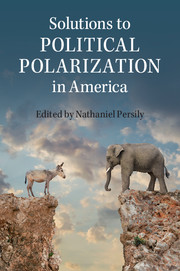Book contents
- Frontmatter
- Dedication
- Contents
- Contributors
- Introductory Chapters
- Reforming the Electoral System
- Strengthening Parties
- 8 Stronger Parties as a Solution to Polarization
- 9 Reducing Polarization by Making Parties Stronger
- 10 Focus on Political Fragmentation, Not Polarization: Re-Empower Party Leadership
- 11 Two Approaches to Lessening the Effects of Partisanship
- Empowering and Informing Moderate Voters
- Lowering Barriers to Policy Making
- Index
8 - Stronger Parties as a Solution to Polarization
from Strengthening Parties
Published online by Cambridge University Press: 05 May 2015
- Frontmatter
- Dedication
- Contents
- Contributors
- Introductory Chapters
- Reforming the Electoral System
- Strengthening Parties
- 8 Stronger Parties as a Solution to Polarization
- 9 Reducing Polarization by Making Parties Stronger
- 10 Focus on Political Fragmentation, Not Polarization: Re-Empower Party Leadership
- 11 Two Approaches to Lessening the Effects of Partisanship
- Empowering and Informing Moderate Voters
- Lowering Barriers to Policy Making
- Index
Summary
Conventional wisdom regards political parties as the engine of polarization. That perspective is understandable enough: if the polarization problem arises from excessive partisanship, then the parties are probably at fault. Disable the parties, the argument goes, and then the representational distortion (and concomitant gridlock) caused by the parties will be mitigated.
This chapter argues the exact opposite position. Parties, rather than being the cause of our polarization, may be the solution. This argument only makes sense if one believes, as I do, that polarization is caused (or at least exacerbated) by the relative weakness of party organizations and leaders vis-à-vis outside groups. In other words, polarization is caused (in part) by party weakness, not strength, and any solution to polarization must begin by strengthening parties; specifically, the party organizations and their leadership.
This chapter compares the most frequently proposed “good-government” anti-party reforms of the campaign finance, primary election, and redistricting processes with their pro-party analogs. The basic differences between the two approaches concern the threats targeted by the reforms and the assessments as to whether greater promise comes from reining in extremes or promoting moderation. The anti-party approach hopes to promote the election of moderates by fostering electoral competition or liberating candidates from the constraints of party loyalty and discipline. The pro-party approach aims to empower the median party member and the party leadership against the extremes.
The chapter ends with an epilogue presenting lessons drawn from my experience as senior research director for the Presidential Commission on Election Administration. Consistent with the approach outlined here, the success of that body arose from an attempt to have partisans lead the work of the Commission. It took polarization as a given and then worked successfully not to avoid it, but to manage it.
THE CONVENTIONAL “GOOD-GOVERNMENT” “ANTI-PARTY” APPROACH
When Americans seek to reform the political system, their prescriptions usually fall into two categories: more democracy or less democracy.
- Type
- Chapter
- Information
- Solutions to Political Polarization in America , pp. 123 - 135Publisher: Cambridge University PressPrint publication year: 2015
- 12
- Cited by



